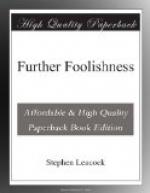But, after all, Mr. Spugg’s troubles—for he is a single man with no ties—are in a sense selfish. It is perhaps in the homes, or more properly in the residences, of the rich that the great silent tragedies are being enacted every day—tragedies of which the fortunate poor know and can know nothing.
I saw such a case only a few nights ago at the house of the Ashcroft-Fowlers, where I was dining. As we went in to dinner, Mrs. Ashcroft-Fowler said in a quiet aside to her husband, “Has Meadows spoken?” He shook his head rather gloomily and answered, “No, he has said nothing yet.” I saw them exchange a glance of quiet sympathy and mutual help, like people in trouble, who love one another.
They were old friends and my heart beat for them. All through the dinner as Meadows—he was their butler—poured out the wine with each course, I could feel that some great trouble was impending over my friends.
After Mrs. Ashcroft-Fowler had risen and left us, and we were alone over our port wine, I drew my chair near to Fowler’s and I said, “My dear Fowler, I’m an old friend and you’ll excuse me if I seem to be taking a liberty. But I can see that you and your wife are in trouble.”
“Yes,” he said very sadly and quietly, “we are.”
“Excuse me,” I said. “Tell me—for it makes a thing easier if one talks about it—is it anything about Meadows?”
“Yes,” he said, “it is about Meadows.”
There was silence for a moment, but I knew already what Fowler was going to say. I could feel it coming.
“Meadows,” he said presently, constraining himself to speak with as little emotion as possible, “is leaving us.”
“Poor old chap!” I said, taking his hand.
“It’s hard, isn’t it?” he said. “Franklin left last winter—no fault of ours; we did everything we could —and now Meadows.”
There was almost a sob in his voice.
“He hasn’t spoken definitely as yet,” Fowler went on, “but we know there’s hardly any chance of his staying.”
“Does he give any reason?” I asked.
“Nothing specific,” said Fowler. “It’s just a sheer case of incompatibility. Meadows doesn’t like us.”
He put his hand over his face and was silent.
I left very quietly a little later, without going up to the drawing-room. A few days afterwards I heard that Meadows had gone. The Ashcroft-Fowlers, I am told, are giving up in despair. They are going to take a little suite of ten rooms and four baths in the Grand Palaver Hotel, and rough it there for the winter.
Yet one must not draw a picture of the rich in colours altogether gloomy. There are cases among them of genuine, light-hearted happiness.
I have observed this is especially the case among those of the rich who have the good fortune to get ruined, absolutely and completely ruined. They may do this on the Stock Exchange or by banking or in a dozen other ways. The business side of getting ruined is not difficult.




